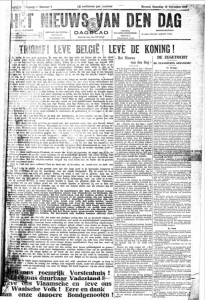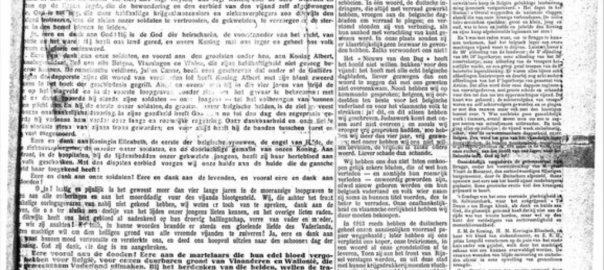The Royal Library of Belgium has scanned and indexed ten historical newspapers from Belgium, and set up a search interface for them called BelgicaPress.

The newspapers currently include:
- Courrier De L’Escaut (Le)
- Echo De La Presse (L’)
- Gazet Van Brussel
Handelsblad (Het) - Indépendance Belge (L’)
- Indépendance Belge (L’) (Edité en Angleterre)
- Messager De Gand (Le)
- Nieuwe Gids (De)
- Nieuwe Standaard (De)
- Nieuws Van Den Dag (Het)
While I don’t have a breakdown of the ranges of each paper, the database of all the papers together ranges from 1831 until 1950 – with a big caveat. While you will get search results for all matches in the database online, all results from 1919 until 1950 are only viewable from within the Library itself, due to copyright issues.
That caveat means the database is almost useless for me (at least online), since although I had a lot of family in Belgium, almost all of it arrived there in the 1920s.
That said, if you have a fairly unique surname (that isn’t translatable into Flemish or French), and you get many results from the 1919-1950 period, you might at least know its worth checking into and ask someone in Belgium to do a search in the library for you.
Of course, there are other things that would be interesting to search besides family names. You could search for your ancestral town name, and see if other people from your town are mentioned in the newspapers. you could also search for information on the Jewish communities there, by using search terms like Jew or Jewish (Jood and Joodse in Flemish, Juif in French). If there were major news items concerning the Jewish communities in other countries (such as pogroms) it’s possible those might also show up.
One final note. The site is, as would be expected in Belgium, is available to use in Flemish (NL) and French (FR). I discovered, however, that secretly it also works in English. While there’s no link from the Flemish or French versions of the site to the English version, use the link above and it will indeed go to an English version of the site. Sometimes it might forget you’re using it in English, and not everything is translated, but it’s not bad. It was definitely developed to work in English, even if they haven’t active that yet on the site. I wouldn’t be surprised if they make the English version available one day directly from their main site, but until then, the above link works.
If you find yourself on a page that is in Flemish or French and want to see if it’s in English, look at the URL in the address field at the top of your browser and see if it says “lang=FR” or “lang=NL” in the string. If so, just replace the FR or NL with EN and hit return.
